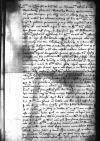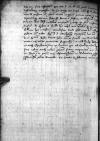Nactus huius nuntii oportunitatem non potui committere, quin, antequam meum, ut pollicitus sum in ⌊⌋, mitterem, has celeritate exortas ad Dominationem Vestram Reverendissimam darem superinscribed⌈daremdarem superinscribed⌉. 153[7]-02-01⌊Heri153[7]-02-01⌋ cum magnifico domino ⌊palatino Pomeraniae⌋ pro rerum nostrarum expeditione ad ⌊serenissimam maiestatem regiam⌋ me contuli, a qua et item a ⌊reverendissimo domino Plocensi⌋ bene sperare iussi sumus, in his primum, quae nostrae ⌊nobilitatis nuntii⌋ insolenter proposuerunt, quemadmodum Dominatio Vestra Reverendissima ex eorum articulis[1] intellexit. ⌊Maiestas regia⌋ regi ab illis non vult, neque quod de pecuniis ⌊maiestatis eius⌋ aut iuribus nostris tam ecclesiasticis quam saecularibus se intromittant, aut quicquam de superioritate et auctoritate ⌊maiestatis eius⌋ disponant, verum quod iis, quae ad eos pertinent, et
cf. Plin. Nat. 38. 85 ne supra crepidam sutor iudicaret; Adagia 1526 No. 516 ne sutor ultra crepidam ⌊non ultra
crepidam intendantcf. Plin. Nat. 38. 85 ne supra crepidam sutor iudicaret; Adagia 1526 No. 516 ne sutor ultra crepidam ⌋, habituri, quando eis respondebitur, dignas obiurgationes. Speravit igitur frustra dominus ⌊praepositus Plotowski⌋[2] cum suis.
cf. Vulg. Prv 21. 30 non est sapientia non est prudentia non est consilium contra Dominum; Vulg. Is 46. 10. 3 dicens consilium meum stabit et omnis voluntas mea fiet; Vulg. Mt 26. 42; 46. 10 fiat voluntas tua ⌊Nulla vis, nullum consilium contra Deum subsistit, illius, etiam invitis malis hominibus, in omnibus fit voluntas etc.cf. Vulg. Prv 21. 30 non est sapientia non est prudentia non est consilium contra Dominum; Vulg. Is 46. 10. 3 dicens consilium meum stabit et omnis voluntas mea fiet; Vulg. Mt 26. 42; 46. 10 fiat voluntas tua ⌋
De gravaminibus et maxime de articulis ⌊Gdani⌋ confectis reiicitur cognitio ad futurum nostrum in ⌊Prussia⌋ ⌊conventum⌋, quo a ⌊maiestate regia⌋, ut cum ⌊dominis consiliariis⌋ in omnibus consentiant, magnifici domini ⌊palatini Posnaniensis⌋ et ⌊Iunislaviensis⌋, frater domini ⌊episcopi Cracoviensis⌋, mittentur. Quod si superinscribed⌈sisi superinscribed⌉ ipsemet dominus ⌊Lucas⌋ forsan venire non poterit, pro eo
succedet filius, dominus ⌊castellanus Posnaniensis⌋. Quae de his querelis et gravaminibus in eo conventu
absolvi non poterint aut componi, in arbitrium ipsius ⌊maiestatis regiae⌋ determinanda dabuntur, quae nobis suam pollicetur gratiam. Non omnes hinc, qui cum ⌊nuntiis⌋ huc venerunt[3], neque ipsi nuntii contenti discedent, quantumvis hic
cf. Juv. 2. 25 Quis caelum terris non misceat et mare caelo; Adagia 1526 No. 281 mare coelo miscere ⌊caelum terrae miscerecf. Juv. 2. 25 Quis caelum terris non misceat et mare caelo; Adagia 1526 No. 281 mare coelo miscere ⌋ statuissent. Quid illis ⌊serenissima maiestas regia⌋ responderi iubebit, Dominationem Vestram Reverendissimam cum primis non latebit.
Nos illis nihil respondimus, sed ⌊maiestati regiae⌋ per modum consilii, quomodo omnia habeant, declaravimus[4]. Cuius rei copiam per dominum ⌊Ioannem a Verden⌋ Dominationi Vestrae Reverendissimae iam missam esse compertum habeo. Quod in rem nostram reliquum erit tractandum et agendum, Deo bene favente non omittemus. De quibus, quod prius scripsi, Dominationem Vestram Reverendissimam per nuntium meum, quem hinc futura septimana recta ad Dominationem Vestram Reverendissimam missurus sum, certiorem reddam etc.
Nova hic prorsus nulla. Cras ⌊maiestas regia iunior⌋ iurare deberet[5], sic enim ⌊maiestas regia senior⌋ statuit. Quod tamen
adhuc incertum est et creditur in hoc conventu non successurum propter eas, quas nuntii Regni cum suis complicibus moverunt, turbas. Qui omnino
contendunt, ut iura et sta
 AAWO, AB, D. 67, f. 54v
tuta eorum prius reformentur. Quae res ⌊serenissimae maiestati regiae⌋ non parum curarum et
difficultatis ingessit. De iis tutius erit loqui coram, quam ut calamo
committi possint etc.
AAWO, AB, D. 67, f. 54v
tuta eorum prius reformentur. Quae res ⌊serenissimae maiestati regiae⌋ non parum curarum et
difficultatis ingessit. De iis tutius erit loqui coram, quam ut calamo
committi possint etc.
Fertur ⌊Turcam⌋ maximas parare copias pro vere tripartitoque exercitu statuisse ⌊Boemiam⌋, ⌊Slesiam⌋ et ⌊Austriam⌋ ingredi. Utinam dominus Deus crudeles eiusmodi conatus per suam misericordiam frustretur. De ⌊caesare⌋ et ⌊Gallo⌋ hic nihil certi auditur, quam quod inter eos bellum hoc intestinum recrudescat, unde quomodo concilium colligi debeat, non video. Reverendissimus dominus ⌊archiepiscopus Gnesnensis⌋ hoc mihi ad Dominationem Vestram Reverendissimam dedit breve. Dedit mihi et simile. Mitto et bullam[6]. cf. Phaed. 4. 23 (24) Mons parturiens; Hor. Ars 139 parturient montes, nascetur ridiculus mus; Adagia 1526 No. 814 parturiunt montes nascetur ridiculus mus ⌊Vereor, ne montes parturiantcf. Phaed. 4. 23 (24) Mons parturiens; Hor. Ars 139 parturient montes, nascetur ridiculus mus; Adagia 1526 No. 814 parturiunt montes nascetur ridiculus mus ⌋. Rogandus est a nobis omnibus Deus Omnipotens hidden by binding⌈[otens]otens hidden by binding⌉, ut tandem Christianismo et Christianis, cf. Vulg. Gn 29. 7 nec est tempus ut reducantur ad caulas greges; Vulg. Mi 2. 12 ponam illum quasi gregem in ovili quasi pecus in medio caularum; Vulg. So 2. 6-7 et erit funiculus maris requies pastorum et caulae pecorum / et erit funiculus eius qui remanserit de domo Iuda ibi pascentur in domibus Ascalonis ad vesperam requiescent ⌊quo ad caulas, unde digressi hidden by binding⌈[i]i hidden by binding⌉ sunt, redire tandem valeantcf. Vulg. Gn 29. 7 nec est tempus ut reducantur ad caulas greges; Vulg. Mi 2. 12 ponam illum quasi gregem in ovili quasi pecus in medio caularum; Vulg. So 2. 6-7 et erit funiculus maris requies pastorum et caulae pecorum / et erit funiculus eius qui remanserit de domo Iuda ibi pascentur in domibus Ascalonis ad vesperam requiescent ⌋, gratiam suam impartiatur. Cui Dominationem Vestram Reverendissimam hidden by binding⌈[mam]mam hidden by binding⌉ ut Dominum et Patrem meum observandi hidden by binding⌈[di]di hidden by binding⌉ssimum in valetudine prospera quam diutissime felicem commendo.
 AAWO, AB, D. 67, f. 54v
tuta eorum prius reformentur. Quae res
AAWO, AB, D. 67, f. 54v
tuta eorum prius reformentur. Quae res 
